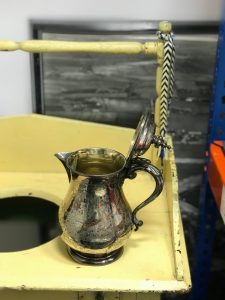 A Silver Plate Jug which was presented to the 1st Administrative Brigade of the Caithness Artillery Volunteers by James C Traill, Esquire of Rattar in 1876.
A Silver Plate Jug which was presented to the 1st Administrative Brigade of the Caithness Artillery Volunteers by James C Traill, Esquire of Rattar in 1876.
The 1st Caithness Artillery Volunteers, like many others of its kind all over Britain, were formed in 1860 due to fears of a French invasion of the British Isles. Despite peacetime, such Voluntary regiments were quick to find recruits.
The first company of Artillery Volunteers Corps (AVC) in Caithness was raised in Wick on the 6th of March 1860, and quickly followed by a 1st Sub-Division formed in Thurso on the 24th of April that same year. Late on the 28th of December the Thurso Sub-Division grew to become the 2nd AVC, and a 3rd was raised at Lybster on the 30th of September 1961.
Together with AVCs from Orkney and Ross-Shire, the Volunteers Corps from Wick, Thurso and Lybster would be formed into the 1st Administrative Brigade of the Caithness Artillery Volunteers in 1863. Headquartered at Wick, the Brigade would have other Caithness units added to it throughout the years.
The Wick Company had a battery at the North Head where they practiced firing their cannon at targets moored in the bay.
The Thurso Company had their own battery on the cliff top opposite of Pennyland Farm. Nowadays only the place-name Battery Point, along with some earth mounds and a set stone remain of it. A Drill Hall for the Company was built in 1873 and is now the Masonic Hall in Olrig Street.
On the 31st of March 1908 the unit was disbanded due to the Volunteers all over Britain being subsumed into the Territorial Force.
Since the feared French invasion never happened, the Caithness Artillery Volunteers Corps were never called into active service. Membership in the Volunteers played a strong formative part in the characters of many young men however, and provided the regular army with many trained recruits. Aside from regular training exercises, the Volunteers did a lot of social activities in the, mainly in relation to fund raising drives. The company often paraded as escorts to visiting dignitaries and twenty one gun salutes were fired from the large guns to mark Royal events. The band was frequently requested by other organisations to play at balls and soirees.
